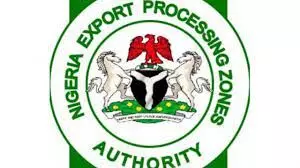- Home
- /
- Business/Economy
- /
- FG begins zero fossil...
FG begins zero fossil energy emission regime — NEPZA

The Nigeria Export Processing Zones Authority (NEPZA) says the licencing of Deep Blue Industrial Park in Lagos begins a regime of zero fossil energy emission in the country.
The Managing-Director of NEPZA, Prof. Adesoji Adesugba, said this while handing over the Declaration Licence to Mrs Anita Omoile, the Managing-Director/CEO of Deep Blue Industrial Park in Abuja.
Adesugba said that NEPZA fully keyed into the Federal Government’s eco-friendly initiative in the operation of the free trade zones’ ecosystem.
According to him, the Federal Government made history with the approval given the first zero fossil energy emission zone in the South-West region at Imoore, Amuwo-Odofin area of Lagos measuring 115,503 hectares.
“This positions Nigeria as the leading continental hub for regional eco-friendly industrial activities and logistics services with free trade zone status.
“The new dispensation will still witness active manufacturing activities without the usual emission of destructive carbon energy into our space.
“This is in line with the Federal Government policy on promoting green environment.
“The Deep Blue Industrial Park is a manufacturing space that promotes food processing, textile and garment production, renewable energy and electric cars as well as research and development services,’’ Adesugba said.
He said that over 50 international enterprises are ready to move to the site in earnest.
On her part, Omoile expressed satisfaction in the seamless and speedy manner in which the approval was given.
She said that NEPZA under the management of Adesugba had taken the `ease of doing business’ policy of the government to a new level.
“Our partners across the globe are enthused with the development and this shows that the country is beginning to create the right business environment to attract the needed foreign direct investments,’’ Omoile said.
She said that the industrial park would generate over 10,000 jobs and inject an estimated 100 million dollars annually into the economy.




